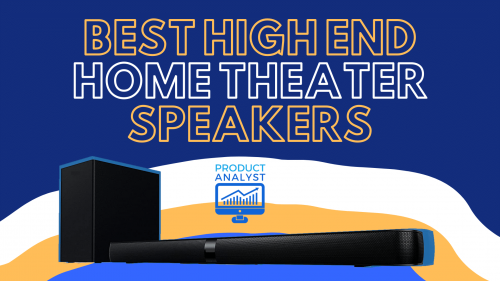
High end is more than just the price. It also refers to the power output, the sound production, bass response, and overall sound experience. Our experts have tested and reviewed the best high end home theater speakers to make sure you are spending your money on speakers that will provide high quality sound.
Reviews of the Best High End Home Theater Speakers
1. Polk Audio T15 Home Theater Bookshelf Speakers
The Polk Audio T15 speakers are designed for heavy bass and well-rounded sound that floorstanding speakers can produce. The bookshelf speaker packages are smaller versions of the floor standing options but are still capable of big sound.
The Polk Audio T15 speakers can emulate sound for any content with 1 tweeter for the highs and a dynamic driver for the mids and lows. This is done with minimal distortion regardless of the audio level or frequency.
These bookshelf-style speakers can be set up however you need to complement your system. They can be wall-mounted or even used as rear speakers to deliver high-resolution audio from your TV screen.
Pros
- Flexible placement
- Well-balanced sound
- Can be used to create full systems
- Capable of low frequency range
- Compatible with most AV receivers
- Smaller than floor standing speakers
Cons
- No sub woofer
- Can be a little sharp
2. Klipsch Black Reference Theater Pack 5.1 Surround System
The Klipsch Black Reference Theater Pack is basically a home theater in a box. It outdoes the Klipsch RP and the Klipsch CDT. The Klipsch RP is only a bookshelf speaker while the CDT are in-ceiling.
For a full-fledged home theater experience, the Black Reference Theater Pack is the best option.
It includes Tractrix Horn Technology and aluminum tweeters, which work together to produce clean and natural sound delivered from the stereo speakers to your floor space.
What you get in the package is a center channel, a wireless subwoofer, and four satellite speakers for flexible placement depending on your setup.
Want to know which brand is better between Polk and Klipsch? Check out our Polk and Klipsch brand comparison here.
Pros
- Full home cinema system
- 1 system for encompassing sound
- 5.1 channels
- Tractrix Horn Technology
- Aluminum tweeters
- Wireless subwoofer
- Satellite speakers
- Flexible placement
Cons
- Requires more space
- The rubber feet of the subwoofer isn’t glued on
3. Acoustic Audio R191 in Ceiling/in Wall 5 Speaker Set
For those who do not have much space to spare, an in-ceiling or in-wall speaker package may be the best, the most affordable, and best-looking option for you. The R191 speakers have dynamic sound dispersion that can be easily integrated into your existing home cinema sound system. You can easily experience impressive audio while seating on one of the top-rated home theater chaise lounges comfortably.
Some people want ones with frames, but others may like the frameless version. The speakers are bi-directional with polypropylene cone woofers to power the low-end tones.
What may seem like a headache to set up is actually quite easy. Each speaker comes with a pressure lock mounting system that secures to your drywall.
Pros
- Sits flush for a room without much space
- Much better setup than bulky speakers
- Crystal clear sound emanating from the room
- Can produce low and high frequency audio
- Easy to install
- Framed or frameless
- Bi-directional
- Affordable
Cons
- No subwoofer
- Need to be integrated
4. Bose Acoustimass 10 Series V Home Theater Speaker System
The Bose Acoustimass is another full surround sound system that delivers enveloping sound suited for larger rooms. They are slimmer and feature an improved profile that allows them to sit flush against your walls.
The Acoustimass bass module pumps out the heavy deep tones while the four surrounding speakers and 1 center channel balance out the rest of the spectrum. You can adjust the volumes and frequency affects to suit your preference.
The smaller components can be wall-mounted to save on space and the installation and setup are easy, with the cables clearly marked.
Pros
- Full system
- Heavy-duty sub
- Can be wall-mounted
- Suited for a large room
- 4 surrounding speakers
- 1 center channel
- Easy setup
- Smaller and slimmer profile
Cons
- Too overwhelming for a smaller room
- No receiver
5. Harman Kardon Premium High Performance 5.1 Channel Home Theater Package
The satellite components of this Harman Kardon speaker combo are voice-matched to deliver seamless audio. The drivers, tweeters and subwoofer come together to produce superior sonic performance.
The subwoofer is downward-firing, which propels the low tones directly to you. You can feel the rumble beneath your feet and the sheer power of the sub depending on the content. The sleek speaker package will bring forth rich audio that you were missing before.
The placement is flexible, and you can choose to organize and set up each part to fit the design of your room for optimal experience.
Pros
- Each piece is voice-matched
- Downward-firing sub
- Easy setup
- Sleek
- Deep bass
- Complete system
- Balanced sound
Cons
- Requires a lot of space
- Single color available
High End Home Theater Speakers Buyer’s Guide
Our expert team has created a simple and easy-to-follow buying guide to help you install your home theater system that won’t cost you much, or help you pick the best option on your own. Let’s take a look!
Home Theater Speakers Placement
Where you place your upscale home cinema speakers really matters. It is the difference between a surround sound system experience and a system that just supplements the screen. Depending on what type of speakers you decide to go for, there are different tips our team came up with.
A full home loudspeaker system will provide encompassing sound regardless of where you place the components, even when you are installing basic sound system such as Logitech Z313 or Z323, there is a way to optimize the placement for the “sweet spot”.
A full home cinema system is often a 5.1 or 7 channel system complete with a wireless or powered subwoofer — a powered subwoofer is a wired option. It also has satellite speakers and a center channel speaker, center speaker, or a sound bar. The 5.1 or 7 channel setup shouldn’t be too difficult, with the only difference being where you aim the satellite speakers.
For high performance sound enhancement, angle your speakers towards your listening spot at a 30-45-degree angle.

For those of you that already have home theater systems, an in-ceiling or in-wall surround sound speaker system would be the best option. They do not have a subwoofer, center channel speaker, or surround speakers as they are supplemental to your existing system.
For the placement of in-ceiling or in-wall speakers, it’s best to surround your entertainment system and your listening spot from all angles.
Bookshelf or even floor-standing speakers below 1000 can be supplemental or carry the full weight of your best high end theater system at home. They are used to provide or enhance surround sound from your original loudspeaker system. They also do not have a center channel or center speaker but some can be embedded with a subwoofer for heavy bass.
Bookshelf speakers can be wall-mounted, which gives them the advantage over floor-standing speakers which can’t be. Again, angling them at 30 to 45-degrees will help you find the audio sweet spot.
Build and Size
Our experts have purposefully chosen three different types, builds and sizes of top of the line cinematic speakers in our review to help you find the most suitable one for your circumstance. They are also all in a different price range.
To find the correct type and size, you must first consider the amount of space you have. You do not want to impede on the comfort of your living room by having a system that’s too large. Many people prefer an inconspicuous setup while others like a big system.
In short, if you lack the space, go for embedded wall and ceiling speakers, especially if you already have a setup. If you have space to spare, the full systems and bookshelf and floor standing models can produce impressive sound.
Bookshelf loudspeakers are easy to set up without taking too much time, and can pretty much fit into any room shape. A full home cinema system will take up quite a bit of space, and the 5.1 like Logitech Z906 and Z5500 or 7 channel setup could take more time. However, the in-ceiling or in-wall speakers are the best space savers without taking much effort to install.
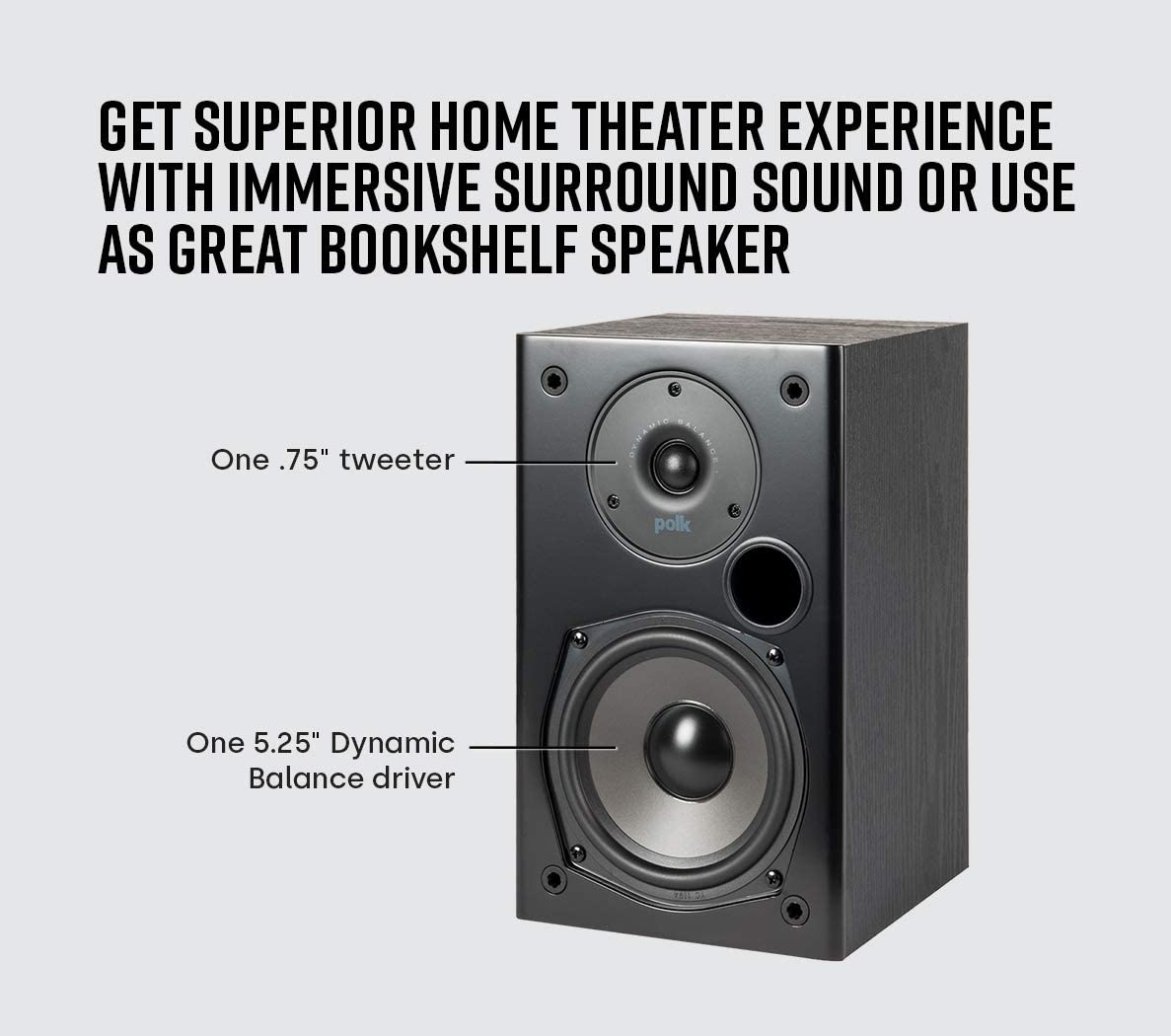
The in-ceiling options can integrate with your av receivers, subwoofer and rear speakers for one all-inclusive home cinema experience. For better integration, the best AV receivers under 500 are available in the market that can work well with your in-ceiling speakers.
After you have figured out which size is best for your living space, the next step is to look out for the build quality. Aluminum dome tweeters and rigid midrange drivers and subwoofers will deliver high performance and reverberating bass and high notes.
Be sure the grille and housing of your premium home surround system is built robustly to prevent damaging the internal components if there are any bumps or scrapes.
Sound Quality
The sound quality is one of the most important categories in our review. This section will tell you how to optimize your best high end home cinema speakers, look for surrounding sound capabilities, get the most out of your center channel speaker, and fully utilize your surrounding audio system.
Depending on if you have a passive or active speaker system, you may need an AV receiver, brands like Yamaha or even Denon, can both fully optimize your sound system. The best home theater system will be passive for more customization.
The first thing to look for in your speaker package for excellent sound reproduction would be the frequency response. This refers to all the notes the center, left and right channel speakers can produce. A high frequency response will bring more realistic and 3D sound.
Most high to mid range products will come with dome tweeter, which is impeccable at mimicking the high notes. Also look at the channels a top of the line theater system offers. 5 or more channels are the industry standard for surround sound.
Other features that can boost your viewing experience would include larger drivers, with 5-inch ones being very impressive. You don’t need to go up to 5-inch speakers for high quality sound, and simple 1-inch drivers will do, but the larger 5-inch ones will bring more power and encompassing sound.
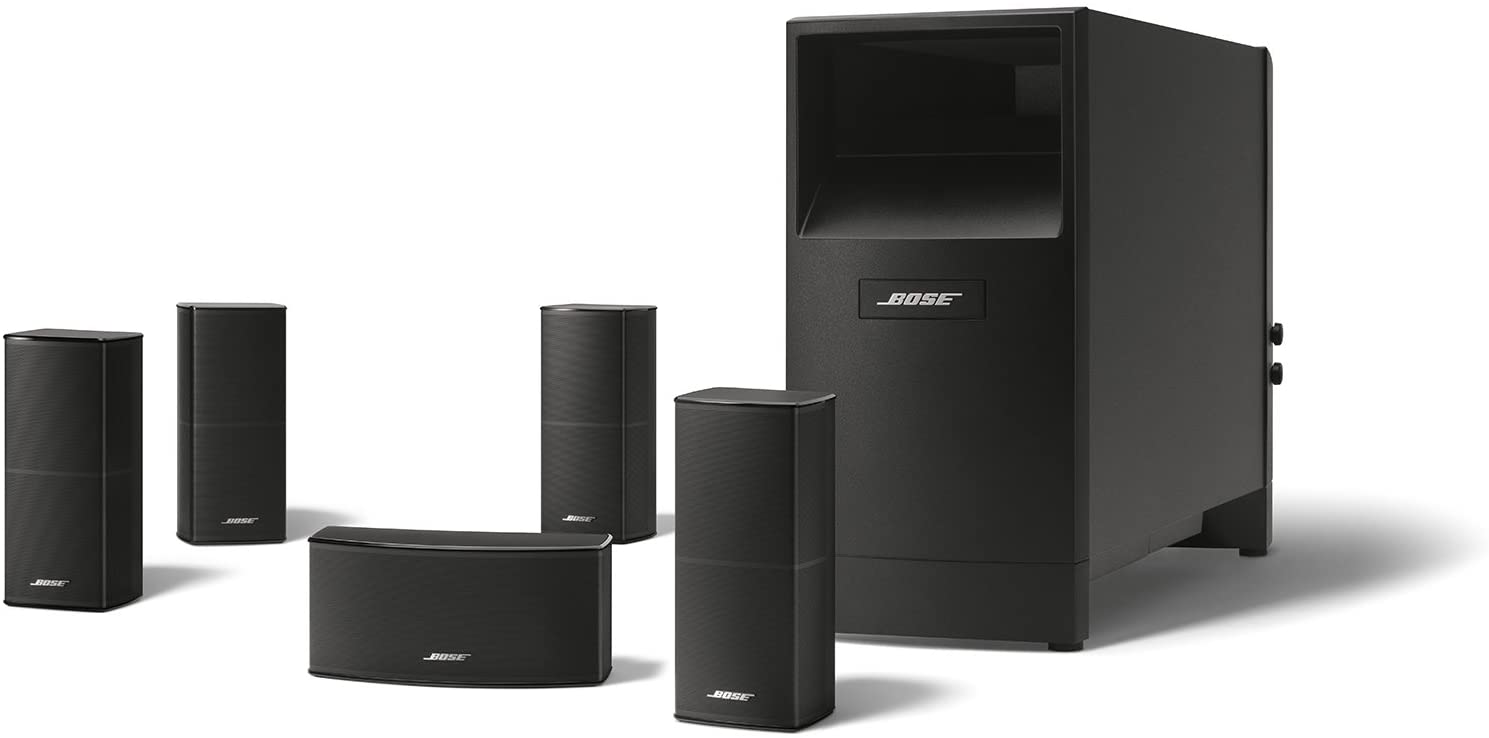
Then look at the advanced audio technologies. Dolby and DTS are the industry-leading experts for a superior audio experience. Sonos, Bose, Klipsch and JBL are some examples of brands that utilize top audio technologies for bass boosts and surround sound. You can also find these technologies in mid-range systems that can cost less.
Certain speaker combos as seen in the Sonos full theater system can offer sound modes. Sound modes are optimized settings that are specially tuned to accommodate certain content. Common sound modes you will find on your surround system include movie, music, news, game, and sports.
Having a dedicated center channel speaker that is automated to enhance speech and optimize voice clarity will help you decipher all the hard to hear words on the screen. A center channel speaker may simply come in the form of a soundbar.
The surround speakers in some product choices can be utilized to create true 3D surround audio. Surround speakers can also be used as rear speakers to boost the sound stage.
The price of your home theater speaker system doesn’t need to come at a staggering price for premium sound. You can find ones for a reasonable price with all of the above add-ons. Our review presents a few good selections that have unmatched sound.
Interested in other home entertainment systems that offer superb surround sound quality? Check our review of Bose Lifestyle 650 here.
Home Theater Speakers Power Rating
The power rating for your best high end home theater speakers is how much power the center channel speaker along with the surrounding components can handle to deliver Hi-Fi audio.
If you have a passive speaker, the power rating is the power the floorstanding, bookshelf or ceiling speakers gets from the AV receiver. You have to ensure that your loudspeakers and receiver are compatible so you don’t blow out or damage anything.
The ratings are listed as either RMS or peak power. Many people get these two figures confused, but our experts are here to clarify things. The RMS, or root mean square, is the power handling the floorstanding, bookshelf or ceiling speakers is capable of consistently.
The peak power is the power it can handle in short bursts. It doesn’t matter if you have 1-inch or larger drivers, the speaker power handling is usually higher at the peak power. It’s important to not go over peak power speaker ratings for a prolonged period as it will damage your loudspeakers.
Speakers with a dome tweeter can be found in mid-range or high end systems. A dome tweeter can withstand the vibrations at higher volumes and is more durable. They can also produce top quality and high-resolution audio that will fill the space.
On another note, you can add one level more of protection to your section. See our list of the best home theater power conditioners that are best for this purpose.
Speaker Sensitivity
The efficiency of the speaker is referred to as the speaker sensitivity. Basically, it means how efficient the speaker is at converting power into audio.
One that is inefficient will need more power to reach the same volumes as one that is. The lost power of an inefficient speaker is converted into heat. So if your speaker overheats easily, and has a hard time reaching higher volumes, then you possibly have an inefficient speaker.
Sensitivity is measured in decibels and the best is within the range of 90-100 dB. Lower than 90 would be considered inefficient to slightly inefficient and anything over 100 is considered amazing.
Speaker sensitivity is measured by impedance. You can only successfully compare two speakers that were measured with the same impedance.
Speaker Impedance Value
What is impedance for the best high end system? For such speakers, you can usually expect them to be measured with a figure between 4-8 ohms, but you can find numbers up to 16.
The impedance is what the word means, which is how much it impedes signal transference through the device. Amplifiers need to be compatible with your speaker impedance value to work properly.
Installation
The installation of the speakers is also important. No one wants to spend more than 30 min to set up and install their new surround system and center channel speakers. Once you have gotten the lay of the room, you need to take a look at the positioning of the different parts.
Where can you hook up your subwoofer to produce the best bass aimed directly at your listening spot? The Sonos surround system is an example of one that’s incredibly easy to set up. The subwoofer for room-filling bass is wireless, and the rear surround speakers can be placed anywhere in the space thanks to their wireless connection.
Other than the Sonos surround system, you can also opt for floor-standing or bookshelf loudspeakers including the KEF Q100 or the Elac B6 to take up less space. While they may have a sub embedded for heavy bass, cinephiles that want a full bass experience may need to purchase an external subwoofer.
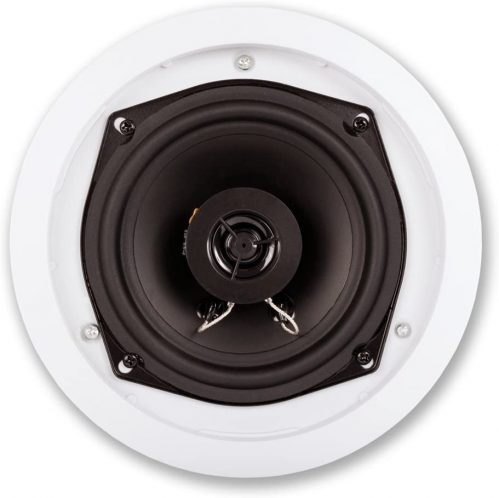
Bookshelf and floor-standing loudspeakers with 1 inch or larger drivers are more difficult to place and install due to their bulkier size. They most likely need to be hooked up to a power source, which could restrict your placement options.
The smallest option we have for surround speakers are the ceiling models. These have small drivers of about 1 inch or a bit larger but they take up no space at all. You may need to cut out a piece of your drywall [1] or ceiling to fit them in, but they sit flush against your surroundings and can deliver top quality sound like full profile speakers.
One thing they may need extra help with is the bass. For these embedded speakers, our experts would advise hooking up an additional subwoofer.
Wondering which is the better brand between Samsung and Vizio when it comes to 4K TVs? Curb your curiosity now.
Our Top Pick For High End Home Theater Speakers: The Polk Audio T15
The Polk Audio T15 speakers earn our expert team’s stamp approval for the best high end home theater speakers. They are well-built with magnetically shielded closures and both speakers in the pair are sonically matched to work perfectly. They bring immersive surround audio to your home theater system.
The installation is simple, and you can choose to mount the smaller T15 components or place them around the room. With high-res deep notes and the help of Dolby and DTS surround, these bookshelf loudspeakers can deliver what a full system can at a very affordable price.
Are you eyeing Bose soundbars to get for your home? Some models emerge over the others — check out which one wins between the Bose 500 and the 700 here.
The post What is the Best High End Home Theater Speakers — Surround Sound For Pros in 2021 appeared first on The Product Analyst.
from The Product Analyst https://theproductanalyst.com/best-high-end-home-theater-speakers/
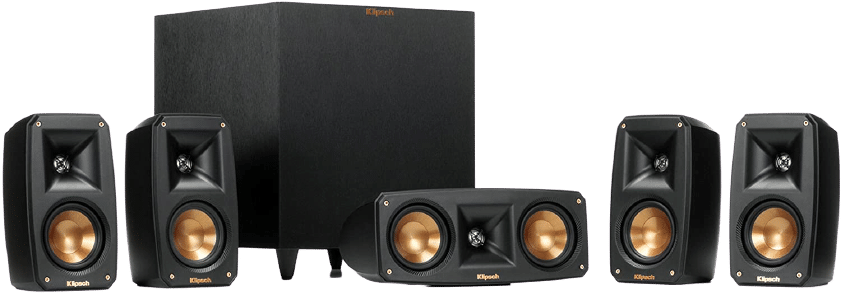
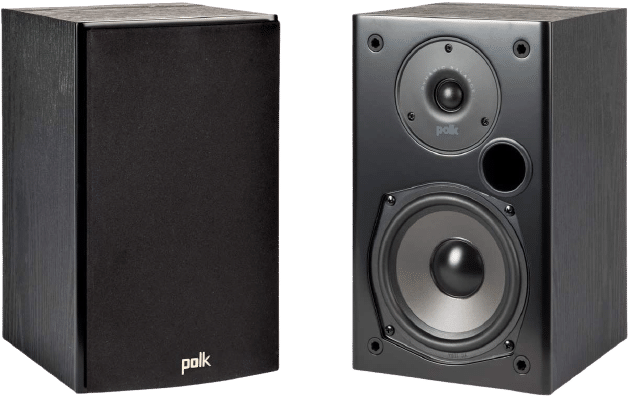
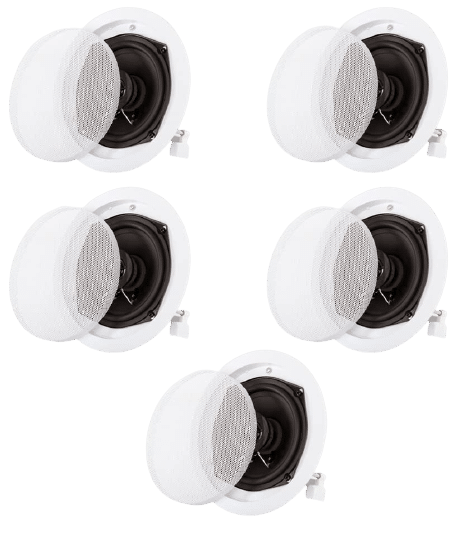
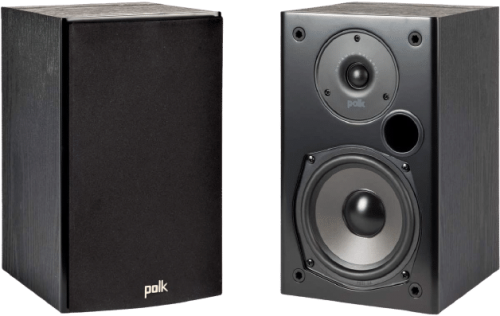
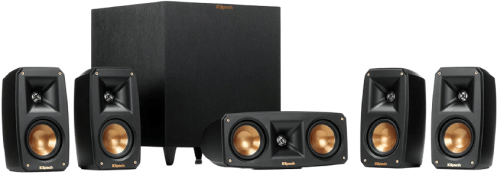
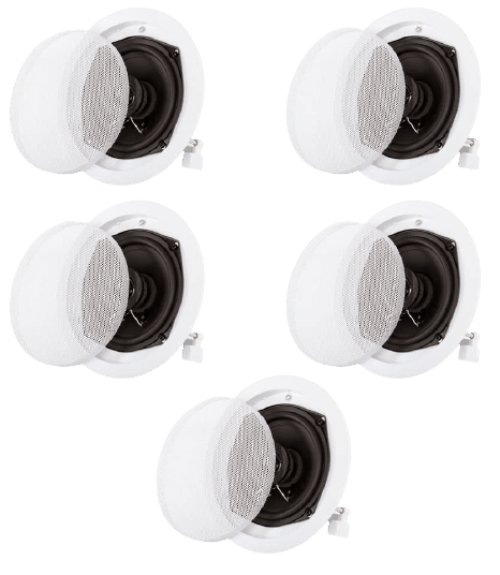
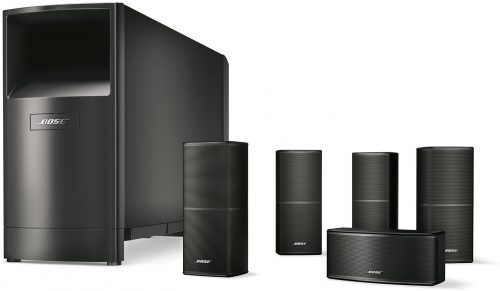
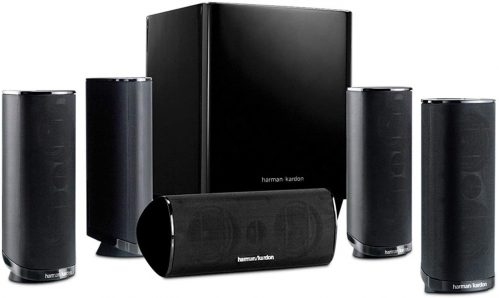
No comments:
Post a Comment